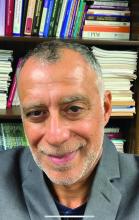Recently, a patient excitedly told me during her session that she had been coming to see me for about 24 years. This was followed by positive remarks about where she was at the point when she first walked into my office.
Her progress has been slow but steady – and today, she finds herself at a much better place even within the context of having to deal with life’s complications. Her surprise about the longevity of this therapeutic relationship was easily and comfortably balanced by the pleasant feeling of well-being.
This interaction reminded me of a conversation I had with a friend of mine, an ophthalmologist who once asked me a related question: Why is it that people have been coming to see me for decades and I have not been able to “fix” them? Does that make me feel badly?
I clearly remember my response, which started in more of a defensive mode but ended with some self-reflection. I reminded him that, in his specialty, like many other fields of medicine, we don’t get to “fix” a lot. In fact, the majority of the conditions we deal with are chronic and lingering.
However, during the process of reminding him to look in the mirror, I was also able to articulate that many of these patients came into my office in potentially dire situations, including experiencing severe depression and suicidal thoughts, ignoring basic needs such as hygiene, feeling paralyzed with panic attacks, or having complete inability to deal with day-to-day situations.
Decades later, many of these patients, while still struggling with some ongoing issues, appeared to be alive and well – and we have wonderful interactions in our office where I get to talk to them about exciting things they’re looking forward to doing with their families or for themselves. Similar analogies can be applied to almost all medical specialties. An endocrinologist might help a patient with severe diabetes or hypothyroid disease get the illness under control but is not able to fix the problem. Clearly, patients’ quality of life improves tremendously through treatment with medications and with education about lifestyle changes, such as exercise and diet.
Even in the case of surgeons who may successfully remove the problem tissue or tumor, the patient is not in fact “fixed” and still requires ongoing medical care, psychosocial interventions, and pharmacotherapy to maintain or improve upon quality of life.
My patient’s remarks led to a similar, delightful therapeutic session reflecting on her progress and what it meant to both of us. We physicians certainly find it very frustrating that we are unable to fix things and make people feel completely better. However, it is important to reflect on the difference our contribution to the process of healing makes for our patients and the impact it has on their quality of life – which is meaningful to them, however small it may be.
, which could lead to minimal or no improvement in the pathological condition but may in fact improve patients’ outlook and willingness to carry on with dignity and satisfaction. It could do us all a lot of good to think of ourselves as healers – not fixers.
Dr. Awan, a psychiatrist, is medical director of Pennsylvania Counseling Services in Reading. He disclosed no conflicts of interest.


